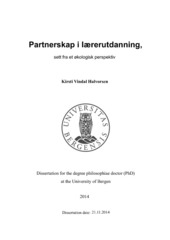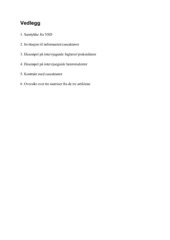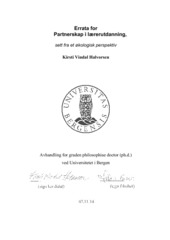| dc.description.abstract | Traditional teacher education has been criticized for fragmentation due to the gap between the theoretical and practical parts of the programs (NOKUT, 2006; OECD, 2005). In order to counteract this criticism, partnerships between university and schools have been developed. The triple aim of partnerships is: to build professional competence, to strengthen the relationship between university and schools and to support student teachers’ professional development (Cochran-Smith & Fries, 2005). Research shows that a well-developed partnership can give a high degree of support to student teachers´ professional development (Darling- Hammond, 2010). But there are rival narratives that raise other issues and mention tensions (Magolda, 2001; Zeichner, 2010) and time-consuming partnership processes (Lemke & Sabelli, 2008). However, there are very few studies of Norwegian partnership development. The aim of this study is therefore to contribute to a more profound understanding of the processes of realizing the triple aim of partnership in a Norwegian setting, viewed from an ecological perspective. The ecological perspective is chosen in order to search for a coherent understanding of the complexity involved in developing interplay in partnerships which are embedded in the Norwegian teacher education system. This is a composite perspective that embraces interwoven ideas concerning the interplay in these partnerships, the quality of relationships, and individuals’ professional development in partnership contexts. It focuses on establishing new niches in partnership contexts, formed by interaction between university teachers, mentors in the schools and student teachers. The empirical evidence is drawn from qualitative case studies (Stake, 1995). The three selected cases are connected to three partnership projects that are embedded in teacher education programs for nursery, primary and secondary schools. The projects are the products of the national authorities’ recommendations about establishing partnerships in the teacher education programs; these recommendations are founded on an evaluation of teacher education that disclosed the well-known gap between theory and practice across all three programs (St.meld. nr. 16. 2001-2002). The main method of gathering data is qualitative research interviews (Kvale, 1997) that were used to elicit a variety of narratives from the principal case participants, represented by triads composed of: university teachers, mentors in the schools and student teachers. The common analytical unit in the three case studies is the triads embedded in the different programs. In order to cast a coherent light over partnership development, the main findings of the three single case studies constitute a unified multi-case study (Stake, 2006). When comparing the main findings of the single case studies with the triple aim of partnership, three patterns of interaction have been identified in the multi-case study. The findings show that the contexts of interplay in the triads alter according to a one-year, two-year and five-year partnership development. The contexts of the one-year pattern are characterized by a breakdown of the various participants’ previously acquired habits and traditions. The contexts of the two-year pattern are marked by tensions inside the triad. The contexts of the five-year pattern are characterized by the triads’ attachment to their common vision and synergic ways of fulfilling their aims. Moreover, four qualities of processes were identified and described as concepts of intentionality, flexibility, unpredictability, and vitality. These concepts are graduated according to the three patterns of interaction in partnership developments. They are seen as aspects of niche development in the contexts of partnership, and presented in the form of four postulates (Kvernbekk, 2005) elaborated below. Intentionality: When broken expectations and tensions concerning autonomy norms are overcome in contexts, then the development of common values can catalyse niches of democracy in partnership. Unpredictability: When unexpected occurrences are experienced as threat contexts and challenge the willingness to take risks, then a dual thrust can catalyse niches of mutuality and learning fellowships. Flexibility: When the limits of tolerance founded on habits and rituals are liberated in play-like contexts, then freedom and new ideas can catalyse niches of innovation. Vitality: When conflicts between belonging and autonomy are overcome in contexts, then curiosity might catalyse niches of engagement, courage and creativity in partnerships. These postulates cast light on the dynamics in the triads as they enact new niches in contexts of partnership, and thereby more or less realize the triple aim of partnership. Moreover, the postulates concerning the four qualities of processes seem to build a bridge between partnership narratives recounting problems or successes. Confronted with the present-day Norwegian situation, where the obligation for leaders of higher education institutions and owners of schools and nurseries to form partnership arrangements has been put on the political agenda, it is suggested that the four qualities of processes may be useful as a foundation for discussions when implementing partnerships, especially between university teachers and mentors in the schools. | en_US |


